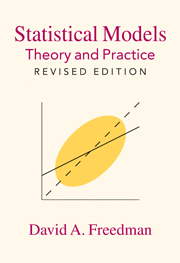Book contents
- Frontmatter
- Contents
- Foreword to the Revised Edition
- Preface
- 1 Observational Studies and Experiments
- 2 The Regression Line
- 3 Matrix Algebra
- 4 Multiple Regression
- 5 Multiple Regression: Special Topics
- 6 Path Models
- 7 Maximum Likelihood
- 8 The Bootstrap
- 9 Simultaneous Equations
- 10 Issues in Statistical Modeling
- References
- Answers to Exercises
- The Computer Labs
- Appendix: Sample MATLAB Code
- Reprints
- Index
Reprints
Published online by Cambridge University Press: 05 June 2012
- Frontmatter
- Contents
- Foreword to the Revised Edition
- Preface
- 1 Observational Studies and Experiments
- 2 The Regression Line
- 3 Matrix Algebra
- 4 Multiple Regression
- 5 Multiple Regression: Special Topics
- 6 Path Models
- 7 Maximum Likelihood
- 8 The Bootstrap
- 9 Simultaneous Equations
- 10 Issues in Statistical Modeling
- References
- Answers to Exercises
- The Computer Labs
- Appendix: Sample MATLAB Code
- Reprints
- Index
Summary
Abstract
I test several hypotheses concerning the origins of political repression in the states of the United States. The hypotheses are drawn from the elitist theory of democracy, which asserts that repression of unpopular political minorities stems from the intolerance of the mass public, the generally more tolerant elites not supporting such repression. Focusing on the repressive legislation adopted by the states during the McCarthy era, I examine the relationships between elite and mass opinion and repressive public policy. Generally it seems that elites, not masses, were responsible for the repression of the era. These findings suggest that the elitist theory of democracy is in need of substantial theoretical reconsideration, as well as further empirical investigation.
Over three decades of research on citizen willingness to “put up with” political differences has led to the conclusion that the U.S. public is remarkably intolerant. Though the particular political minority that is salient enough to attract the wrath of the public may oscillate over time between the Left and the Right (e.g., Sullivan, Piereson, and Marcus 1982), generally, to be much outside the centrist mainstream of U.S. politics is to incur a considerable risk of being the object of mass political intolerance.
- Type
- Chapter
- Information
- Statistical ModelsTheory and Practice, pp. 315 - 430Publisher: Cambridge University PressPrint publication year: 2009



